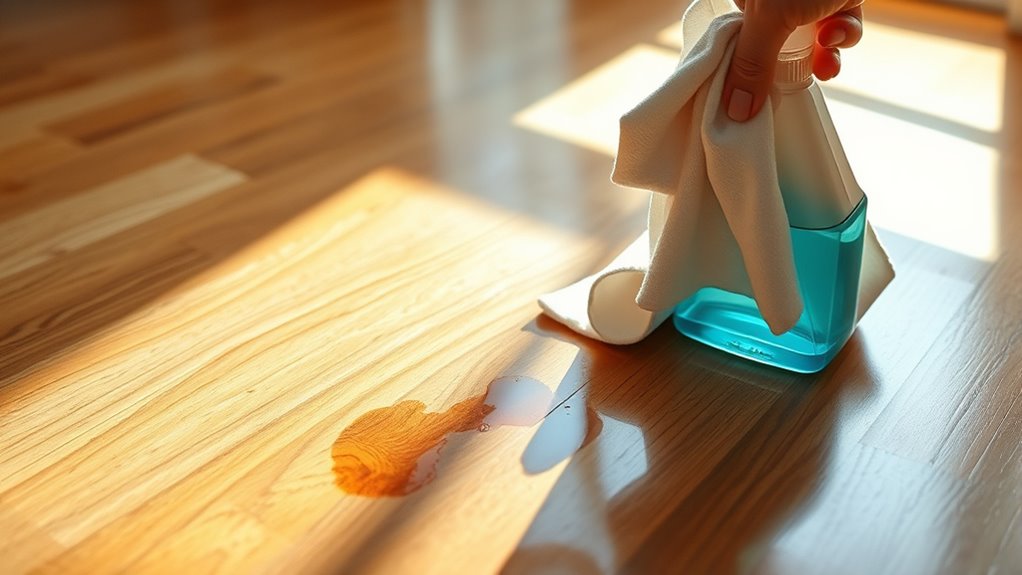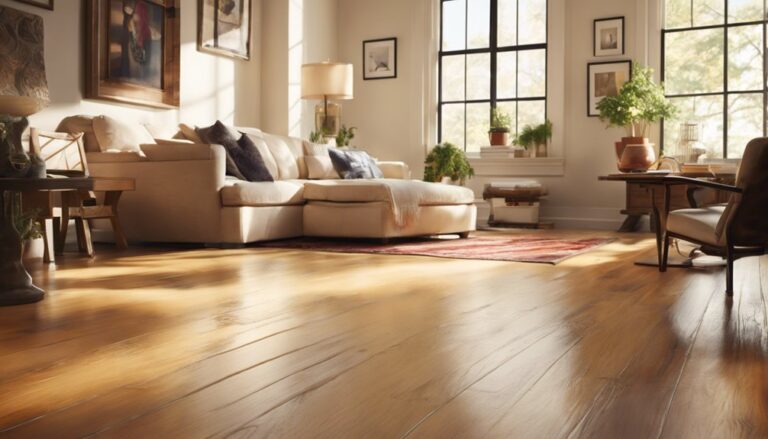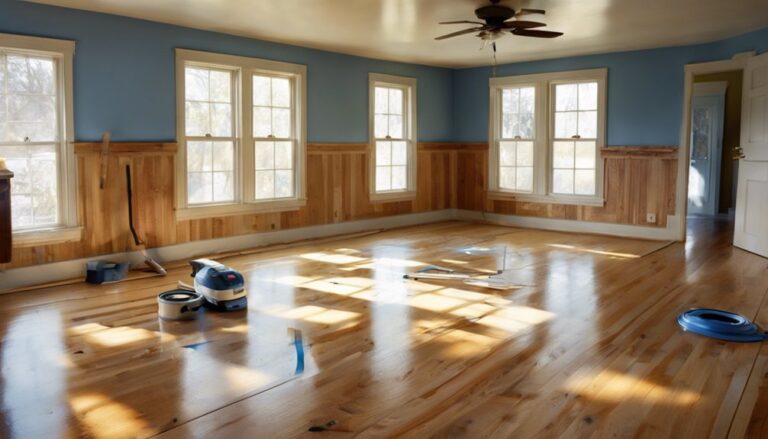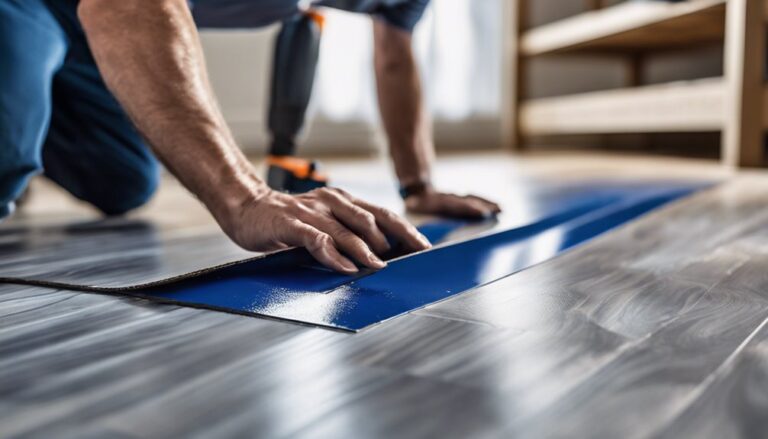If your dog has urinated on hardwood floors, act quickly by blotting the area without rubbing to avoid deeper damage. Use a moisture meter to check how far the urine penetrated. Clean with a hardwood-safe enzymatic cleaner that breaks down odor-causing bacteria without harming the finish. For stubborn stains, gentle scrubbing and baking soda can help absorb moisture. If odors or damage persist, professional restoration might be necessary. Keep going to find out how to protect your floors and prevent future accidents.
Identifying the Extent of the Urine Damage
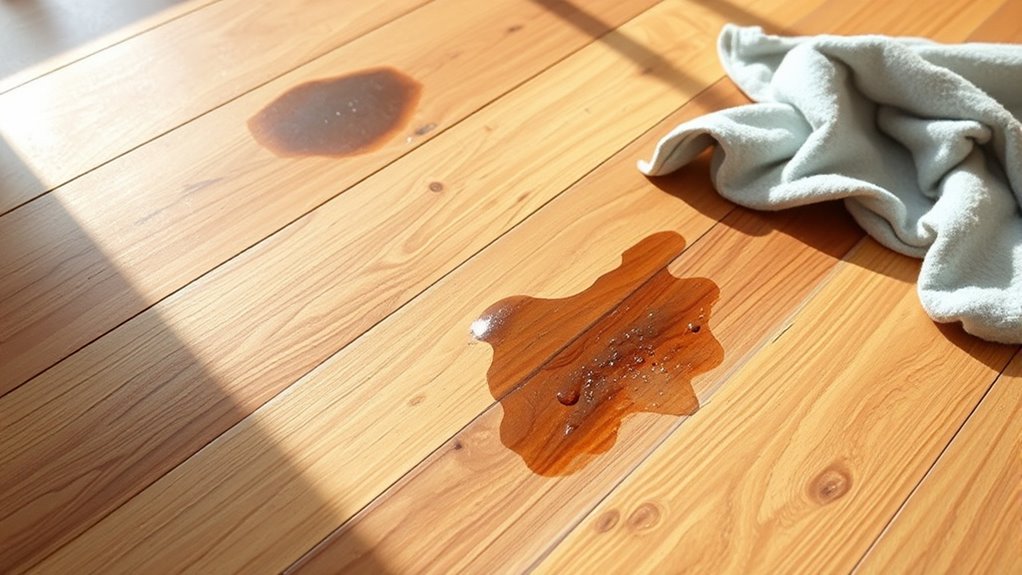
Before you start cleaning, you need to determine how deeply the urine has penetrated your hardwood floors. This initial damage assessment is essential to avoid ineffective treatments and further harm. Check for discoloration, warping, or soft spots that indicate significant urine saturation. Lightly press the area; if it feels spongy or swollen, the damage is likely extensive. Use a moisture meter if you have one, to measure urine saturation beneath the surface. Identifying the extent of the damage allows you to choose the right cleaning or repair method, saving you time and frustration. Taking this careful step empowers you to restore your floors properly and maintain the freedom of a clean, healthy home environment without guesswork or wasted effort.
Immediate Steps to Take After an Accident
When your dog has an accident on hardwood floors, acting quickly is essential to prevent lasting damage. First, grab your cleaning supplies immediately—paper towels or a clean cloth work best to blot the urine without rubbing it deeper into the wood. Avoid spreading the stain; instead, press firmly to absorb as much liquid as possible. Next, use an appropriate odor neutralizer to eliminate the smell, which helps deter your dog from marking the same spot again. Be sure to apply the neutralizer according to the instructions, targeting both surface and any absorbed urine. Quick, confident action not only protects your floors but also keeps your home fresh, giving you the freedom to enjoy your space without worry.
Choosing the Right Cleaning Solutions for Hardwood
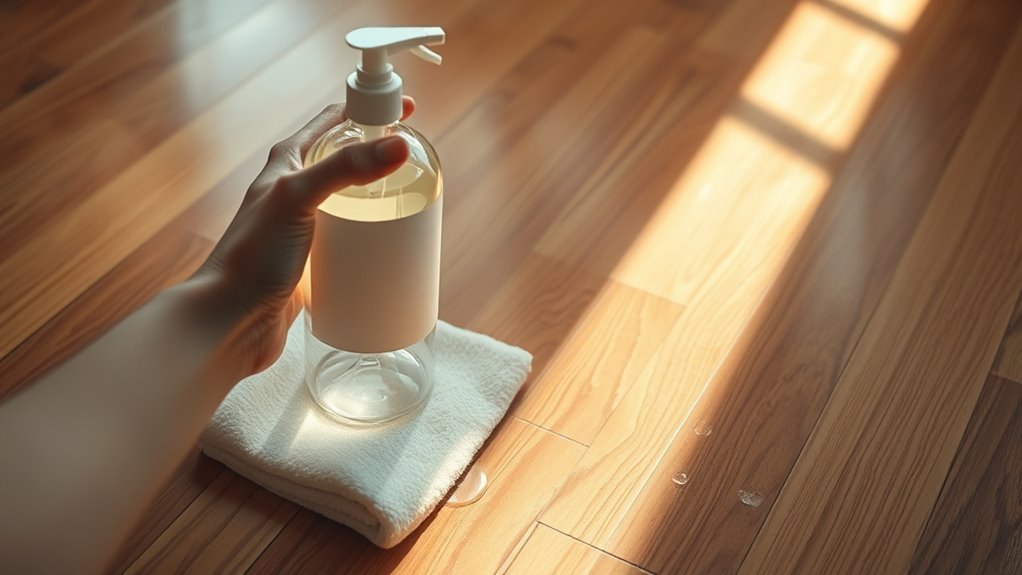
Since hardwood floors can be sensitive to harsh chemicals, you’ll want to choose cleaning solutions specifically designed to protect their finish while effectively removing urine stains and odors. Natural cleaners and enzyme solutions are your best friends here—they break down urine molecules without damaging wood. Avoid bleach or ammonia, which can ruin your floor’s beauty and your peace of mind.
| Solution Type | Effectiveness | Emotional Benefit |
|---|---|---|
| Natural Cleaners | Gentle, safe | Confidence in protection |
| Enzyme Solutions | Targeted stain removal | Relief from persistent odors |
| Commercial Cleaners | Varies widely | Caution, need for research |
Choosing wisely means your floors stay pristine, and you reclaim your home’s freedom and comfort.
Deep Cleaning Techniques for Stubborn Stains
Selecting the right cleaning solution sets the stage, but stubborn urine stains often call for more than just a simple wipe-down. To truly free your hardwood floors from persistent marks, you’ll need targeted stain removal and the right cleaning tools. Here’s how you can tackle those tough stains:
- Use an enzymatic cleaner – it breaks down urine compounds, eliminating odors and stains deeply embedded in the wood.
- Gently scrub with a soft-bristled brush – this helps lift the stain without damaging the floor’s finish.
- Apply a mixture of baking soda and water – let it sit to absorb remaining moisture, then vacuum it up.
Preventing Future Accidents and Protecting Your Floors
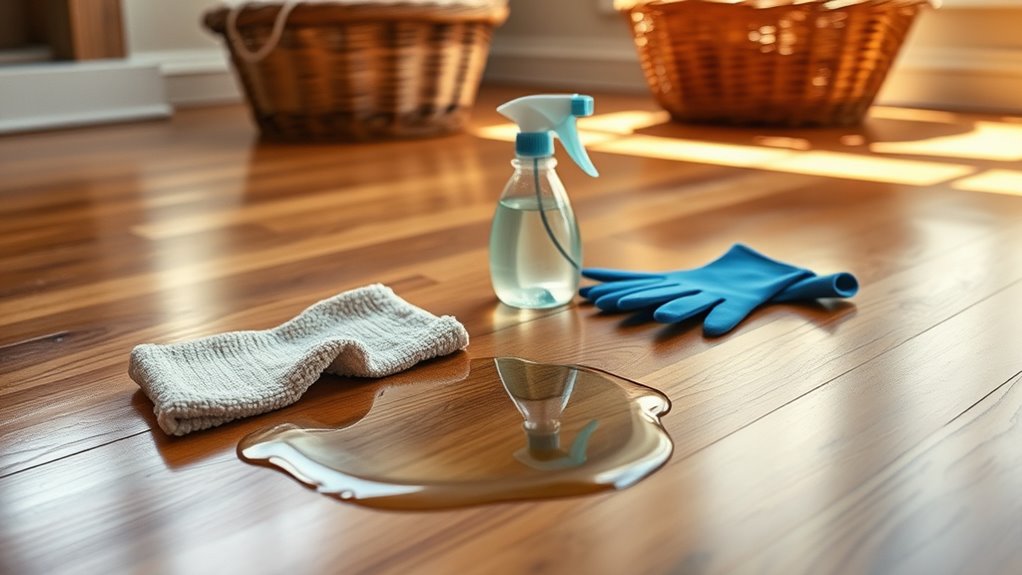
Although accidents can happen, taking proactive steps will help you minimize future incidents and safeguard your hardwood floors. Start with consistent urine training—establish a regular schedule for bathroom breaks and reward your dog for proper behavior. This reduces confusion and accidents indoors. Next, consider floor protection options like water-resistant sealants or protective mats in high-risk areas. These create barriers that prevent urine from seeping into the wood. Also, clean spills immediately to avoid lingering damage. Remember, prevention is about understanding your dog’s habits and adapting your environment accordingly. By combining effective urine training with strategic floor protection, you’ll maintain your hardwood’s beauty and enjoy the freedom of a happy, accident-free home.
When to Seek Professional Help for Hardwood Restoration
Even with the best training and protective measures, some urine damage can be stubborn and may require more than just regular cleaning. If you want to regain your freedom from constant worry about your floors, knowing when to call in professional services is key. Consider seeking expert help if:
- The odor persists despite thorough cleaning, signaling deep-set damage.
- You notice discoloration, warping, or soft spots that DIY methods can’t fix.
- You’re concerned about long-term restoration costs but want lasting results.
Professionals bring specialized tools and knowledge to restore your hardwood, often saving you money and stress in the long run. Don’t hesitate to invest in expert care—it’s about preserving your home’s beauty and your peace of mind.

